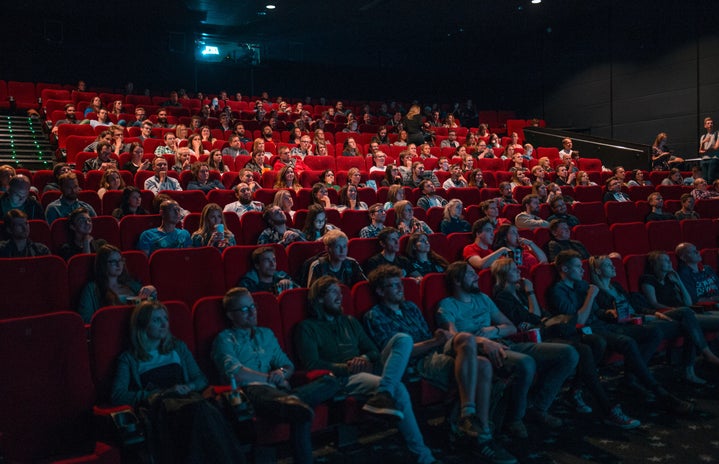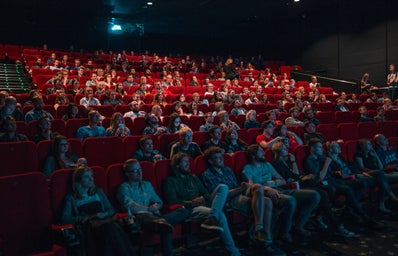Broadway lovers know how difficult it is to successfully adapt extravagant stage musicals into contemporary films. Between the catastrophe of “Cats” (2019), the tragedy of “Dear Evan Hansen” (2021) and the disappointment of “Mean Girls” this year, this genre of films has an unfortunate reputation among fans. Stage musicals exist in a unique, intimate and highly evocative medium that is difficult to translate to the screen, not just artistically but culturally.
Despite the stigma, I know it is achievable because film can be utilized beyond the restrictions of a stage; there are greater opportunities to creatively tell these stories with expansive sets, high-budget costuming, visual effects and intentional editing. “Tick, Tick… Boom!” (2021), for example, is one of my favorite movies. “West Side Story” (2021) received immense critical acclaim, and “In the Heights” (2021) was a beautiful and charming experience.
Therefore, despite the uncertainty, I was highly optimistic about my screening of “Wicked.” I wanted to see what it did well, where it fell flat and how it became the newest cultural phenomenon of 2024. Above all, I tried to analyze its significance within the genre of modern Broadway film adaptations.
A major controversy when it comes to this genre is casting. “Into The Woods” (2014) faced backlash for hiring film actors who can sing over classically trained singers who can act. In such a musically complex production, the cast could not thoroughly do it justice.
This is where I think “Wicked” knocked it out of the park. There was skepticism around hiring pop singer Ariana Grande to play Galinda Upland, and although I am a fan of Ariana, I understand why. However, Grande got her start in Broadway’s “13” (2008) at age 15 and has proved herself as a “Wicked” superfan throughout her career. I can safely say that with “Wicked,” she has solidified herself as one of this generation’s most talented and versatile vocalists.
Her comedic skills and acting choices brought a new life to the character I did not expect. With experience acting on both stage and screen and unquestionable vocal talent, Grande was an inspired choice for the role. The key is not only her abilities but her respect and appreciation for the stage musical, as well as her understanding of on-screen acting.
Cynthia Erivo as Elphaba Thropp absolutely stole the show for me. Erivo won a Tony for Best Actress in a Musical for “The Color Purple” in 2016, and she has also starred in several films, most notably “Harriet” (2019). In “Wicked,” she adapted Elphaba to the screen beautifully, bringing a new complexity to the character I never understood before.
Her subtle acting choices, mixed with her powerhouse vocals, were simply magical. The ability to embody unique, colorful and theatrical characters while humanizing them for the screen is difficult. Erivo and Grande pulled it off seamlessly, supported by other brilliant actors like Jonathan Bailey, Ethan Slater and Jeff Goldblum. This lively, yet careful ensemble was really the key to this film’s success.
Another benefit to the medium of film is the limitless opportunity for detail and creative storytelling. Director Jon M. Chu fully leaned into the fantasy elements of the original “Wizard of Oz” (1939), a significant piece of cinema history that helps justify the existence of adapting “Wicked” into a film.
The beautiful colors, the detailed costumes and sets, the many references and the absurdity all pay homage to the original film and everything the Broadway production brought to the table. “Wicked” immerses you in the world it creates, and nothing really pulled me out of it.
However, it fell flat in one particular area: lighting. Vibrant scenes were dulled by harsh backlighting that distracted (and almost blinded) viewers. There are more than a few scenes where I was frustrated that I could not see what was happening because of the bright lights behind the actors. Of course, stage lighting is entirely different from film lighting, but I could not help but wonder why this choice was made. It may have been an attempt to add more realism, but it clashed with the overt fantasy of every other aspect of the film.
The announcement that the film would be split into two parts and that Part One had a run time of two hours and 40 minutes raised some eyebrows before its release. However, previous Broadway film adaptations have frequently disappointed fans by cutting out songs, decreasing the importance of certain characters, changing the story or adding unnecessary scenes.
After viewing “Wicked,” I completely support their choice to stretch the run time. It is clear to me that the creators have a complete appreciation for the stage musical as they did not cut a single song from Act One. The pacing felt completely purposeful, as every scene was given time to breathe, which makes more sense than keeping the standard, fast-paced nature of a stage production.
The dramatic moments were given a lot of attention and time for the audience to fully digest. Because of this, it makes perfect sense to fit the story into two feature-length films.
This doesn’t mean that “Wicked” was just not meant to be a film in the first place; it just means that creative choices had to be made to adapt it properly. Not forcing it into typical film standards shows that the creators were intentional about doing the musical justice so that a broader audience could enjoy it.
Which brings me to what has intrigued me the most: cultural impact. “Wicked” has already become the highest-grossing Broadway film adaptation at the domestic box office since “Grease” (1978). The soundtrack debuted at number two on the Billboard 200, making history for its genre.
There are more promotional products and merchandise than I’ve seen for any film like this. I can’t go anywhere without seeing green and pink together somehow. The apparent intersection between musical theatre and pop culture here is Ariana Grande, who has heavily promoted the film to her devoted group of pop music fans.
I was curious how this would play out, remembering Renee Rapp in “Mean Girls” (2024) bringing in moviegoers who didn’t even know it was a musical. However, “Wicked” does not hide that it is a musical. It is not embarrassed to be one. It is authentic, heartfelt and incredibly meaningful to Broadway lovers and those less familiar.
When these types of films succeed, I find more people enjoy musicals than expected. I love how they bring people together and resonate with many different audiences. I love that this show was adapted to a medium that you can enjoy wherever you live. I love that it pushes the artistic value of cinema and that it may even encourage fans to enjoy and support live theatre.
While I am highly critical of many Broadway film adaptations, I thoroughly recommend “Wicked.” The performances are terrific, the pacing is engaging throughout, it’s aesthetically pleasing and it’s a wonderful musical. It’s perfect to see with your family and friends this new year.
If you’re eager for Part Two or are interested in the source material, check it out on Broadway or on tour. You can also read the novel on which musical was based. It’s “Popular” for a reason!


